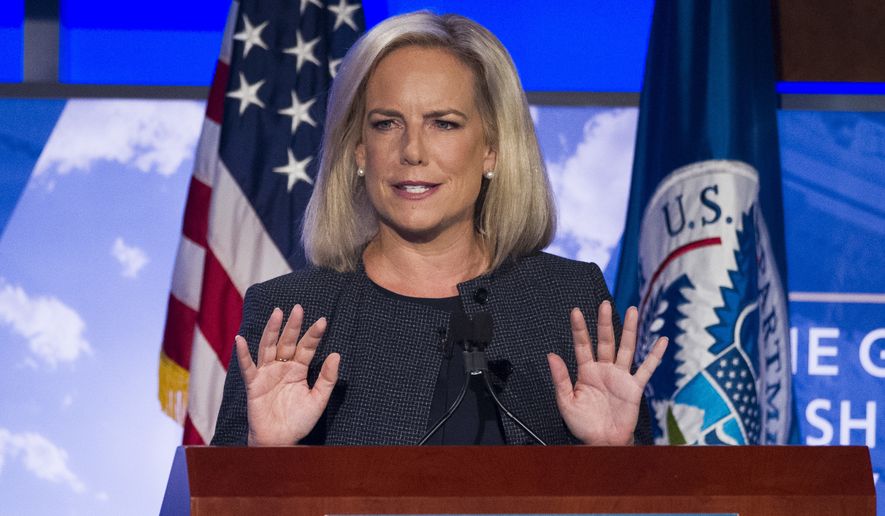The Trump administration moved Thursday to regain control of immigration detention decisions, proposing rules that would allow them to hold parents and children together in facilities until they’re either deported or win their cases.
Once finalized, the proposal would also end some of the intrusive court oversight of treatment of children and return decision-making to the administration, which for years has had its hands tied by judges’ orders.
The 203-page proposal, published online by the Federal Register, establishes minimum standards of care for all illegal immigrant juveniles, including those who come to the border with parents and unaccompanied alien children.
Most of the protections already in place will be continued, with unaccompanied alien children still released to sponsors as quickly as possible.
But families that show up at the border could be detained together under the rules, which supersede a 2015 court order that requires them to be released after just 20 days.
The administration hopes that change can help stem the flow of illegal immigrant families — and those posing as families — that have streamed north in recent years, hoping to take advantage of the 20-day policy.
“Today, legal loopholes significantly hinder the department’s ability to appropriately detain and promptly remove family units that have no legal basis to remain in the country,” said Homeland Security Secretary Kirstjen Nielsen. “This rule addresses one of the primary pull factors for illegal immigration and allows the federal government to enforce immigration laws as passed by Congress.”
She issued the proposal along with Health and Human Services Secretary Alex Azar. Both departments share the care of children.
The proposal will supersede the Clinton-era Flores agreement, which for more than 20 years has governed the treatment of unaccompanied alien children, or illegal immigrant juveniles who arrive at the border without parents.
In 2015, Judge Dolly M. Gee expanded the agreement to include children even if they come with parents. She ordered that those children be released from immigration custody generally within 20 days. Because the children are to be released to parents, that meant releasing the whole family.
It was a highly controversial decision, which the Obama administration fought at the time — though it received scant press attention.
Mr. Trump’s decision largely returns to the original Obama-era policy.
Peter Schey, the attorney for illegal immigrant children in the Flores case, didn’t respond to an email seeking comment.
Democrats in Washington blasted the rules, saying they don’t want illegal immigrant families to be detained at all.
“This decision will create worse conditions for these children and will inevitably leave lasting psychological footprints,” said Rep. Joaquin Castro, Texas Democrat.
But Jessica Vaughan, policy studies director at the Center for Immigration Studies, said the new rules mark a return to the original intent of the Flores settlement, preserving “generously humane treatment” while maintaining the integrity of immigration enforcement.
“This is the best solution to a serious problem, at least for now,” she said. “Simply releasing these families creates a big incentive for others to pay huge sums to smugglers and make the dangerous journey. It’s wrong to encourage people to do that. Keeping the families together in custody while they are being processed is not ideal, but it’s preferable to other options.”
She said it will now be up to the government to prove it can quickly process the families and push through their legal cases in short order, leading to their deportations or full release.
The proposed regulations, which now go through a period of public comment before becoming final, would end the “catch-and-release” treatment of at least some illegal immigrants.
The Trump administration tried a different approach earlier this year with its zero-tolerance border policy. Under that policy, the government pursued criminal charges against illegal immigrant parents nabbed jumping the border. Because there are no family facilities in federal jails, the children had to be separated.
Public outcry and judicial intervention put a halt to zero tolerance and sent the administration back to look for other answers to the surge of illegal immigrant families.
Thursday’s regulations are long-overdue. A 2001 addendum to the original Flores settlement called for them, but neither the Bush nor Obama administration followed through.
Under that deal, the Flores settlement is automatically terminated 45 days after the regulations are finalized.
That would end the involvement of Judge Gee, who has overseen Flores compliance and regularly ruled against the government and in favor of immigrant rights activists.
Judge Gee is poised to appoint a special monitor to report to her on conditions in detention facilities.
• Stephen Dinan can be reached at sdinan@washingtontimes.com.




Please read our comment policy before commenting.